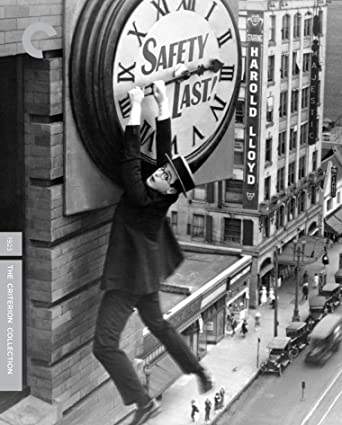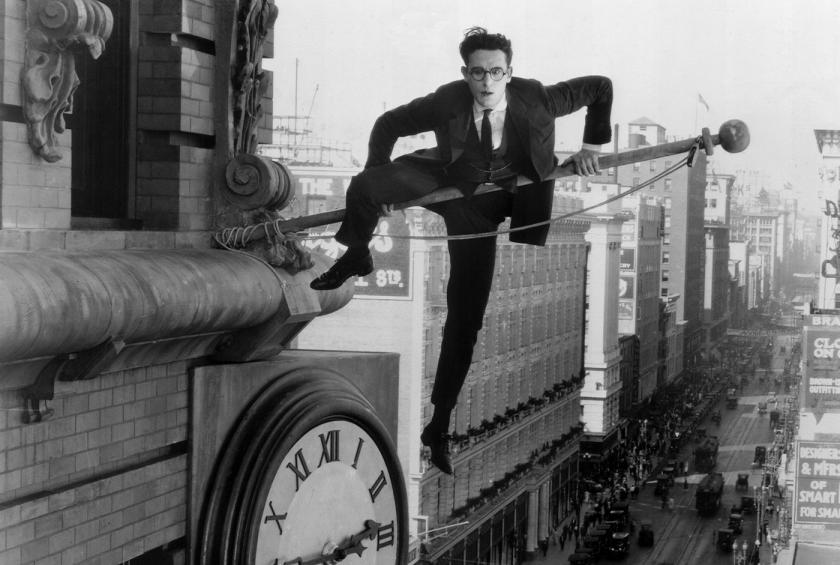Comparing Harold Lloyd with Keaton and Chaplin is difficult. Though the input he brought to his films was crucial, Lloyd didn’t write or direct, and there’s much discussion as to whether he was a genuine comedian or a straight actor playing the part of one, his matinee idol appearance befitting a conventional leading man. Lloyd’s trademark horn-rimmed spectacles were suggested by producer Hal Roach, concerned that his star property was too handsome to be funny. The glasses are a superb prop, Lloyd’s normality making his physical comedy all the more effective.
Directed by Fred C. Newmeyer and Sam Taylor, 1923’s Safety Last! stars Lloyd as a naïve country boy trying to make his fortune in Los Angeles, his girlfriend (Lloyd’s wife Mildred Davis) believing that he’s more than a menial sales assistant. The department store scenes make up a hefty chunk of the film’s running time, and there are some wonderful sight gags. Lloyd crawling on all fours to avoid being spotted by management, and his entering the shop floor disguised as a mannequin are priceless, as are his terrifying attempts to board a crowded streetcar. Naturally, Mildred arrives to see how he’s getting on, and it’s Lloyd’s impecunity which prompts the most famous sequence in his film career, that of climbing the 12-storey building as a money-making stunt. The joke is that Lloyd has actually paid his fearless flatmate to do the deed; instead, Lloyd shimmies ever higher, increasingly desperate to throw in the towel and switch places. The ascent is both terrifying and exhilarating. Mice, pigeons and dogs impede Lloyd’s progress to varying degrees, his dangling from a clock face one of cinema’s iconic images.
 Criterion’s restored print is pristine, and this reissue includes some excellent extras. A short documentary presented by historian John Bengtson and visual-effects expert Craig Barron explains how sets were constructed on the roofs of different buildings, giving the impression of increasing height. Changing streetscapes give the game away, though clever misdirection means that we don’t notice. Stunt doubles were used for some shots, though it’s clear that Lloyd put himself at considerable physical risk. That we know how the effects were realised never diminishes their brilliance.
Criterion’s restored print is pristine, and this reissue includes some excellent extras. A short documentary presented by historian John Bengtson and visual-effects expert Craig Barron explains how sets were constructed on the roofs of different buildings, giving the impression of increasing height. Changing streetscapes give the game away, though clever misdirection means that we don’t notice. Stunt doubles were used for some shots, though it’s clear that Lloyd put himself at considerable physical risk. That we know how the effects were realised never diminishes their brilliance.
Kevin Brownlow’s Thames documentary makes a convincing case for Lloyd as ‘the third genius’, explaining how an accident with a prop bomb caused the loss of a finger and thumb on Lloyd’s right hand. A cleverly designed prosthetic glove makes this difficult to spot, and that Lloyd is occasionally hanging on with just three fingers makes you admire him even more. Carl Davis’s soundtrack is idiomatic and effective. Essential viewing.
- Read more film reviews on theartsdesk
- Read more of Graham Rickson's Classical CDs Weekly on theartsdesk















Add comment